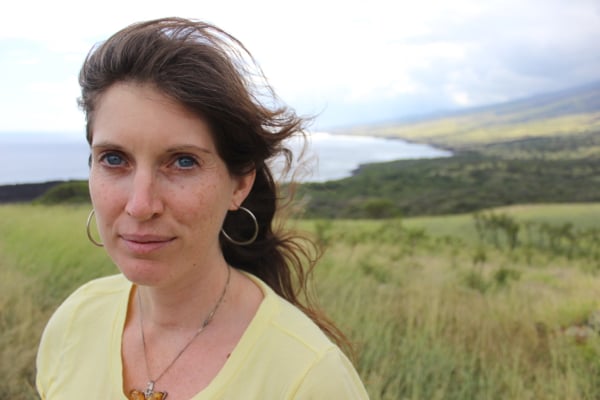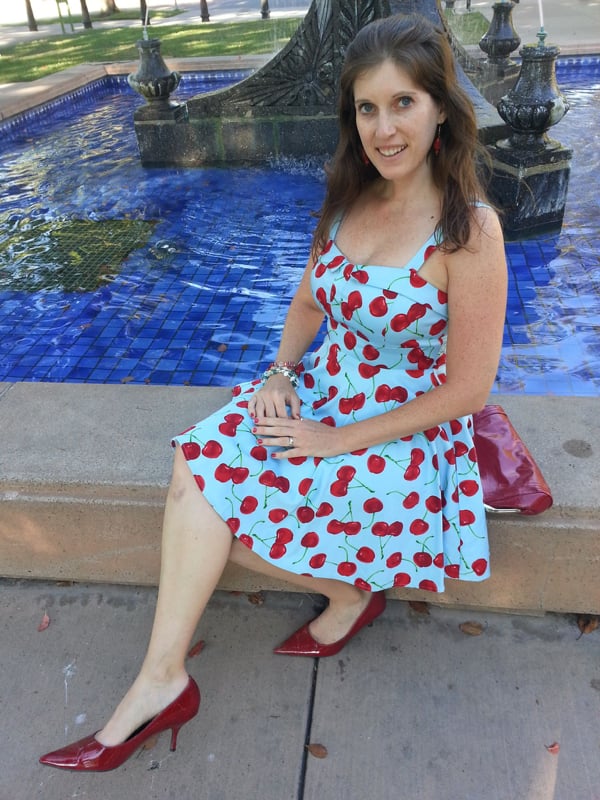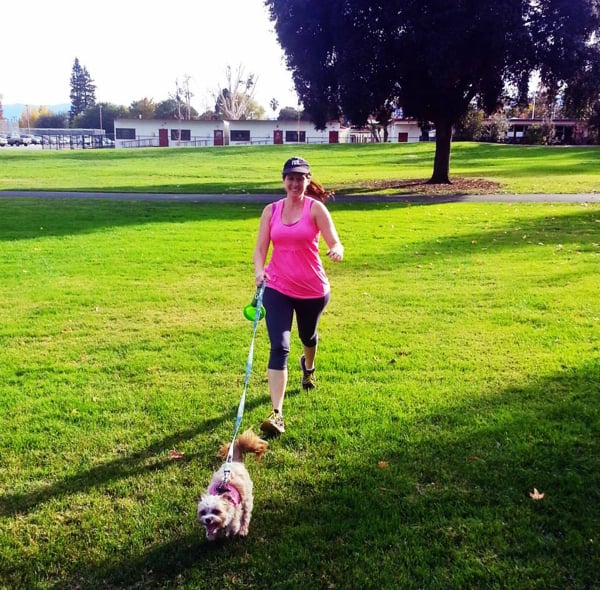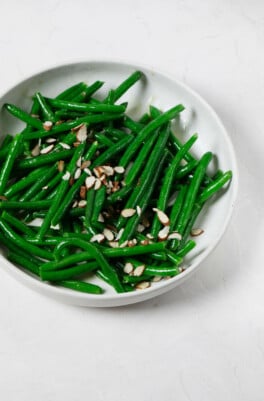Happy Thursday, everyone. So glad that you liked the kale salad on Tuesday! I’ve already gotten some positive reviews on Twitter, which is great.
One of the highlights of my experience at Vida Vegan Con this year was meeting Kimmy, who is the author of the blog Rock My Vegan Socks. Kimmy and I have been reading each other’s blogs for years now, and I’ve consistently been moved by the honest, heartfelt, and wise comments she has left on different ED and green recovery-themed posts. It’s always been clear to me that Kimmy had firsthand perspective on eating disorders, and I secretly hoped she might share her story with this community.
Today, I’m happy to present her green recovery narrative to all of you. As you’ll see, Kimmy has been through many ups and downs with food. Like me, she’s waltzed with many types of disordered eating, including both anorexia and orthorexia. Her story illustrates the fact that ED recovery is rarely, if ever, a linear process, and it’s also a reminder that food struggles can shift and morph with different phases of our lives (even if the fundamental, underlying issues remain the same). Kimmy has called this story a “recovery in progress,” and I’m honored that she’d speak up about her ongoing process in this space. I deeply inspired by her humility and her commitment to self-love, and I hope you will be, too.
Loving My Curves – Recovery in Progress
Ok, you caught me. I am so not in love with my curves. But the difference between me now and me from before, is that I want to be. I’m working towards loving myself inside and out.
I started out like many teenage girls, not really comfortable in my own skin and simultaneously dreading and looking forward to high school. I had never had a boyfriend and most of the guys I knew regarded me as one of their own. And I was a little sensitive about my looks from having been teased about horribly crooked teeth and being excessively hairy. I felt slightly more confident starting high school after a summer of getting acquainted with wax hair removal and a retainer. As the first year wore on, guys still weren’t asking me out and I lost my confidence. At age 14 it was extremely important to feel pretty and have a boyfriend. If only I could take my 14-year old self aside and show her the bigger picture of life.
In the spring, a guy noticed me. Finally! He thought I was gorgeous and worshipped the ground I walked on. I was in love with being in love. So much so, that I cut off all ties with my friends as this new guy wanted to spend every possible minute with me. He became controlling to the point where I stopped all extra curricular activities that I had so enjoyed. He also wasn’t fond of the word no and pressured me into things I did not want to do. After a year and a half, I finally began to realise that this was an unhealthy relationship and I broke things off. Since I didn’t really understand what he had done was wrong, I didn’t talk about it to others. I became withdrawn and didn’t know how to handle what had happened. A family crisis also occurred around this time and that added to my already high stress levels. I felt as if control had been taken away from me and I found a way to cope with that. I started controlling everything in my life that I could from my daily routine to every single thing I put in my body.
I started restricting the amount and type of food I ate. The less I ate, the more in control I felt. At times, I felt so vulnerable from everything, I had panic attacks and felt paralyzed with fear. I started exercising to quiet the thoughts in my head. My parents thought it was a rough time breaking up with my first boyfriend, and it was, but much more than they understood it to be. My older sister was the one who seemed to grasp something was really wrong. She would make my favourite meals and take me out, encourage me to hang out with friends and have fun. If it weren’t for her, I think things probably would have been a lot worse. My habits continued getting worse, but she was the life preserver that kept me from really drowning.
My mom took me to our family doctor when I started complaining of chest pain and he wanted to hospitalize me. I told my mom I wouldn’t go and promised her I would get better on my own. Around this time, I met my husband and we became highschool sweethearts. He expressed serious concern about my eating and exercise habits and I felt the strength to try and get better for him.
I continued to struggle with my eating issues off and on until my mid-twenties. In university, I was getting sick of dealing with my issues through food and went to individual and group therapy. I slowly learned how to deal with things and not use food as a coping mechanism. My weight started fluctuating a lot, up & down, never really settling for long. I was never happy with the way I looked.
In 2005, I had a “wake up” call. I was diagnosed with thyroid cancer around the time I lost my father to a brain tumour. At first, all I could do was grieve my loss and feel sorry for myself. I went on a binging downward spiral eating anything and everything. But after a year of this, I felt completely awful. So I made a change and started running. I would just run up and down the block once a week, then twice. I also started taking exercise classes at the local gym and noticed I was feeling a lot better. At the same time, I started to slowly change the way I was eating. Less frozen dinners, more fresh veggies. My husband and I started eating less junk. I started losing weight, but it was very slow & gradual and something that just naturally occurred while I made these small, but significant changes.
After a year of this, I started to become very interested in food and how it works with our bodies. I had a few vegan friends that looked and felt amazing! I had been vegetarian off and on for several years, but could never give up my beloved cheese. Then I picked up T. Colin Campbell’s book “The China Study”. I promptly went vegan after reading it. I kid you not – the day I finished that book was the last non-vegan day I had. The extensive studies he did linking animal proteins to cancer growth & occurrence, especially to people who have already had cancer, was enough to make me swear cheese off for good. Going vegan was one of the best things I ever did. It opened up a whole new world to me. I went from being the pickiest eater ever to trying anything if it was vegan. I reached a healthy and stable weight, my hormones balanced, my allergies disappeared and I felt amazing.
I would love to tell you my story ends here… but it doesn’t. I realised I loved nutrition and exercise so much that in 2011, I quit my job to become a Group Fitness Instructor and a Registered Holistic Nutritionist. While I learned about nutrition, it triggered some old self-destructive feelings and I started restricting again without even noticing. I wanted to be “perfect” with my eating and became orthorexic. Friends (and even random people at the gym) started commenting about the weight I had lost.
As I was finishing my Holistic Nutrition Program, my husband was offered a job in California. I’ve never really dealt well with change since I was a teenager as it makes me feel as if I have no control over a situation. And moving from Ontario, Canada to Santa Clara, California was a big change! Before we moved I was ecstatic and my husband was beyond stressed at the prospect of moving to a new country and working for a new company. When we finally got here, he thrived and I withered. He had this exciting new job that he loved (and still does over 3 years later!) and I went from working two part time jobs and going to school full time to not being able to work at all with the immigration situation. I gradually started overindulging, otherwise known as eating my feelings and then over-exercising to compensate. I gained a lot of weight rather quickly and had a hard time dealing with it. I would restrict and binge and exercise and exercise and exercise. I was always on edge and really depressed. My hormones were completely out of whack and I hadn’t had my period in months.
It was on a trip to visit my family just over a year after we had moved that I finally realised I needed help. I decided to sleep over at my sister’s house the night before I flew back to California as her house was closer to the airport. It was also a lot closer to the gym and I wanted to get up really early to catch a boot camp class before flying home. That night, my mom called my sister’s house to find out when she could see me again before I left. I told her I wanted to go to the gym before flying out, which meant I wouldn’t see her my last morning. She had to be at work by the time I would get done my class at the gym. I could hear tears in her eyes when she realised I was picking the gym over her. I felt bad, but not bad enough to change my exercise plans. When I got back home, I realised how horrible it was to have done that, especially since she has a hard time with me living so far away.
With the encouragement from my amazingly supportive husband, I started treatment with an Eating Disorders Specialist in October of 2013. I was too ashamed to tell anyone else about it. I started seeing the doctor three times a week, with weekly visits to a dietician and therapist. It was really difficult at first, but I’m realising now that I’m fortunate to have been given the option of out-patient treatment. At first, my doctor and I butted heads. She basically told me to stop being vegan as it would hinder my recovery. I was angry and didn’t listen. But I thought a lot of things she said were a little ridiculous. I mean, 2 hours of intense exercise a day isn’t so much right? I had also almost cut out all carbs and wasn’t having any snacks during the day (unless I was binging…). I was a complete mess. I was at high risk for osteopenia and hadn’t had my period in well over a year.
In the past, I had tried to get better for others in my life; my sister, parents and husband. Ultimately, I realized the only way to have recovery stick was to want to get better for me. At some point during treatment, I did tell my sister and a couple of close friends that I was getting help. They were incredibly supportive and helpful and always there for me and I’m lucky to have them in my life.
Over the 16 months I saw the ED specialist, I started realising my behaviour wasn’t healthy for me. At first, I would lie to her, telling her I was gradually cutting down on exercise and eating more carbs, but I wasn’t getting better. Very gradually, I started taking some of her recommendations and I started feeling better. It took a long time, but we finally started seeing eye to eye on things. One of the toughest things for me was to not have “no” foods. To not look at food as good or bad, but food/fuel for my body and to eat. When I see foods as “bad” it triggers me to try and avoid them at all costs until I finally break and binge on them. Sure there are foods that are more healthful than others, but I’ve learned that it’s ok to enjoy a variety of things and if I eat a little more of the foods that aren’t quite as healthful, my body naturally starts to crave more healthful things. I’m still trying to figure out balance, it’s definitely a work in progress. I also went to group therapy with other women going through similar issues and it helped a lot.
When my doctor finally realised I hadn’t gone vegan to be restrictive, she eased up and we started getting along better. I was finally told a few months ago that I’m done treatment =) I don’t feel completely recovered by any means, but I feel pretty good about things and will slowly continue on my recovery path.
Each and every time I read a Green Recovery story, I read a detail or an insight or a feeling that closely mirrors some part of my own story. That’s part of the beauty of this series, I think: we see parallels in each other’s stories that help us to build kinship and empathy. There’s a striking amount of similarity between Kimmy’s story and mine. We experienced our first bout of disordered eating around roughly the same age, and found similarly deceptive feelings of control and safety in our diseases. We both continued to struggle well into our early twenties, in spite of appearing stable to others. Kimmy took a turn, as I did, into orthorexia, and her description of that experience was eerily familiar. I’m so proud of her for taking an active, committed approach to treatment, in spite of the deep shame that she felt as she learned to ask for support. And I’m so proud that she continues to move forward, learning with each and every day to nourish herself.
I’m also so impressed by the fact that Kimmy remained committed to veganism even when her treatment provider expressed doubts about whether or not it was healthy for her. She seems to have had an intuition that veganism might prove to be a healing path, and her growth since then is certainly affirmation of her original instinct. I also want to note that Kimmy’s description of her battle to overcome “no foods” is really important, and it brought to mind a question that a lot of readers with EDs ask me over email every single week: how do I reconcile my recovery and my efforts to get over “no foods” with being vegan? I’m overdue for a post on that topic, and I’m going to publish one next week.
For now, I just want to thank Kimmy for opening up to us all. Kimmy labeled her story as “recovery in progress,” but the truth is that recovery is an ongoing for most of us: years and years after the fact, we can still experience new and different challenges and areas of growth when it comes to food and self-love. I know that this post wasn’t easy for Kimmy to write and that she spent a lot of time on it. Kimmy, your efforts and your honesty were well worth it, because you’ve created a beautiful narrative, one that’s full of courage, persistence, and self-awareness. This whole community is richer for it.
xo
This post may contain affiliate links. If you use these links to buy something I may earn a commission. Visit my privacy policy to learn more.





Leave a Comment
You are a closer friend through this article bacuase you healed many who are in need. thanks and God bless.
Thank you for the kind words Ronoh.
Thank you so much for sharing this! I love these green stories. It’s so nice to know there are other people out there who are struggling with the same thing as me. It feels comforting to know I am never alone.
You are never alone! That’s the one thing that keeps me going sometimes, we’re all there for one another.
Thanks Heidi =)
Thank you Gena for sharing this powerful story, and thank you Kimmy for bravely writing it and putting it out there to help others with their journeys.
Thanks Sarina =)
I love all the Green Recovery stories and can’t wait for the “Green Recovery” book. While I’m not vegan, my own recovery has been similarly unorthodox, and remains “food focused.” “Becoming vegan” often involves changing one’s relationship to food in a way that can be constructive and healing. It can also satisfy some of the same ego-syntonic needs that the eating disorder does, making it easier to let go of the disorder (the biggest challenge in treating anorexia is that most anorectics like having their disease). There’s a risk of orthorexia, sure, when the focus is on the health benefits of vegan diets, so I like how you focus on other aspects of healing (when you talk about veganism as a healing path).
Kimmy’s story highlights the importance of an ED therapist – even if they are suspicious of vegan diets, with good reasons sometimes – the process of defending your food choices can help you to get honest about why you’re making them. Sometimes the vegan choice isn’t necessarily the healthiest choice, but it can still be the right choice, and a veganism rooted in compassion, if the compassion extends beyond the animals and the environment to include oneself, is going to be the most healing path. I found having a therapist helpful in confronting just how “disordered” my eating was.
I look forward to your article on “no” foods. I often describe my own way of eating as “whatever I want, whenever I want it, in whatever quantities I want.” Of course the reality is that I’m an extremely picky eater and I never ever snack. So it probably seems to the outside observer that I have a bunch of “no” foods. But the thing is, I don’t ever ever deprive myself of something I want because it has x calories or fat grams or carbohydrates, etc. If I have a humongous portion of strawberry shortcake (last night!), I don’t say “I’m being bad.” I don’t use “good” or “bad” to describe foods, or my eating behavior.
I think for me it comes down to whether will power is involved in my rejection of this or that food. A lot of “food” doesn’t appeal to me and that’s why I don’t eat it (in the way animal foods don’t appeal to vegans, I guess). I will often reject a food because I am boycotting the company that produces it, because I don’t support the way it’s produced, etc. It’s not like I want something and I’m not letting myself have it for an unfounded reason (specious health concern, fear of calories, etc.). It’s tricky though when one is in throes of disorder – because often there is no desire to eat (that was never my case, my anorexia was always an exhaustive struggle against my appetite, I used up my life’s quota of will power) but I knew people who seemed to not want to eat … Just underscores the importance of working with a therapist – who can help make sure you have a big long “yes” list even if you’re no longer eating meat and dairy.
Having a therapist is important for any significant struggle as they can really help shine light on things we may not see ourselves and help us through our dark times.
I’m looking forward to reading the post about “no” foods as well, I have made leaps & bounds on this, but still have work to do. I’m glad that isn’t something you have difficulty with (strawberry cheesecake is super delicious!). Will power is a very tricky beast – this is also something I work on.
Thanks for insights Elizabeth.
Thanks for sharing your story, Kimmy! 🙂
Thanks Bianca
Great article, very inspiring!
natural supplements
Thank you Kimmy for sharing your story. Recovery is such a process and I resonated with much of your narrative.
Gena- can’t wait to read your article on no foods and veganism and recovery.
Thanks Kait =)
Great story, thanks so much for sharing! It’s true that EDs are always there even after recovery and can be a great thing to channel into healthy, positive eating habits. It was great seeing both of you at VVC!
Thanks Christine =) VVC was awesome! Wish there were more….
Thank you for sharing my story Gena! I’m so glad to have had the chance to finally meet you in person. You are definitely one of the motivating factors in getting help and moving forward.
Thank you for the kind words =)
So proud of you! I got tears in my eyes reading this <3
Aw thanks Lacy =)